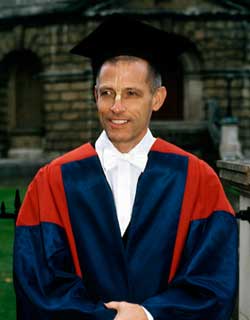First Ph.D. students graduate from OCHS

Kenneth Valpey
Saturday, 1 May 2004
The Centre's first two Doctoral students graduated from Oxford University this year – Ravi Gupta and Kenneth Valpey. As scholars and practitioners of Hinduism, both focused their studies on various aspects of the Hindu tradition.
By providing qualified tutors and academic supervisors to the University and by giving practitioners of Hinduism somewhere to study and live without compromising their practice, the Centre has successfully facilitated these two and many others' stays in Oxford.
Ravi Gupta, just 22 years old and originally from Boise, Idaho, U.S.A., completed his thesis on the ìVedanta Philosophy of Jiva Goswami.î Having studied Sanskrit since the age of 12, Ravi had his sights set on pursuing an advanced degree in Sanskrit and Hindu studies. At 17, he graduated with a BA degree in Philosophy and a BS degree in Mathematics from Boise State University.
Ravi considered applying to Harvard Divinity School, but decided against it because there was no infrastructure to support his practice as a Hindu while also being a student.
The Centre is a real community that supports both Hindu practice and study of the Hindu tradition. This combination is especially possible in Oxford because it has a long history of this. I'm so happy I came here because without this sense of community, it would have been very difficult for me,î said Ravi.
After completing his M.St. in Religious Studies, with a focus on Hinduism and Christianity, he began his doctoral studies in 2001. His decision to explore Jiva Goswami's works and impact was strategic.
The Gaudiya Vaishnava tradition is well-studied by scholars, but the studies have almost all focused on the aesthetic, sociological, emotional and cultural sides of the tradition. The amazing philosophical contributions have been completely ignored. I felt there was a gap in modern Hindu scholarship, and I wanted to help fill that gap,î said Ravi.
As Jiva Goswami is considered the most important philosopher of the modern Gaudiya Vaishnava tradition, Ravi was particularly interested in studying and sharing his works which address questions relevant to any philosopher in the greater Vedanta tradition of India.
For the future, Ravi aims for a teaching and research position at a university.
ìThrough publishing and speaking, I want to establish Vaishnavism in particular and Hinduism in general as a respectable and well-known area of study,î said Ravi.
As for Kenneth Valpey, his decision to study the deity (or murti) worship of Lord Krishna was motivated by almost three decades as a pujari, or ritual priest. During that time Kenneth played an important role in composing a two-volume manual for Vaishnava deity worship.
Kenneth completed his BA (honours) in Religious Studies, at the University of California, followed by an MA in The Cultural and Historical Study of Religion,î at the Graduate Theological Union, Berkeley.
Deity worship is something very prominent in Hindu temples. In the west, there is a tradition of condemning such things as the opposite to religious activity. So I thought it was something that could be dealt with in a careful, analytical way to help those in the west to learn what the Hindu tradition says, as well as to help Hindus articulate themselves in discussions on deity worship, said Kenneth.
Kenneth has been offered a position of Post Doctoral Research Fellow at the OCHS.
We are extremely proud of Ravi and Kenneth. They are first-class ambassadors for the Centre. They are proof that careful study of Hinduism in a supportive environment will make a huge impact on people's perspectives of the Hindu tradition, and will positively influence their world view,î said Shaunaka Rishi Das, Director of the Centre.
